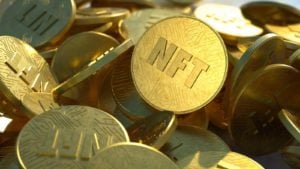Don’t Sleep on These 7 Cryptos That Will Mint Millionaires
0
0

The Federal Reserve is likely approaching peak hawkishness, and may start cutting rates next year. Meanwhile, the upcoming Bitcoin (BTC-USD) halving will shift the supply-demand dynamics in this sector. Against this backdrop, savvy investors may have an opportunity to get in early on certain small-cap cryptocurrencies before they go parabolic.
To be clear, such projects remain an ultra-high-risk segment of the crypto market. With the potential for 100x returns comes the potential for 100% losses. These speculative bets should be limited to no more than 5% of your overall portfolio. But the possible upside may be worth it for those with a high risk tolerance.
In the following sections, I’ll spotlight seven lesser-known cryptocurrencies that could mint a new class of crypto millionaires in 2023. Of course, remember to do your own deep dive into these projects before investing in any of them.
ATOR Protocol (ATOR-USD)

ATOR Protocol (ATOR-USD) supports the privacy-focused Tor network through crypto incentives. By rewarding contributors with its native token, ATOR seeks to expand Tor’s footprint and strengthen its infrastructure against censorship. One creative product is the ATOR Router Hotspot, which enables seamless connection to Tor without cumbersome setup procedures. This simplicity could drive adoption among less tech-savvy users. ATOR’s specialized relay is optimized for anonymous routing. Plus, integration with the protocol’s tokenomics structure incentivizes running high-performance nodes to empower Tor’s capabilities.
From my perspective, using artificial intelligence in tandem with crypto rewards offers a promising path to enhance the Tor network. However, I would point out that a minimal amount of the project’s anticipated activity is being realized, as is true with many crypto projects. In the crypto space, AI is mostly a buzzword used to drive up valuations.
Still, the protocol seems to be steadily building value at a pace which appears organic. I believe ATOR holds compelling potential at its current market capitalization, but would require a lot of investor patience. Below $50 million, now does look like a good time for investors to click the buy button.
DIONE Protocol (DIONE-USD)

Technically, DIONE (DIONE-USD) plans to integrate real-world installations like solar, wind, and hydro resources directly into its blockchain architecture. Renewable energy generation would secure DIONE’s network while rewarding holders for participation – on paper, of course. I don’t see any of that being realized anytime soon.
There’s also a commitment to philanthropy through allocating revenues to nonprofits tackling healthcare, education, inequality, and environmental priorities. Again, realizing such an ambitious decentralized green energy ecosystem requires incredible commitment and seamless execution. As a concept, DIONE has significant hurdles to demonstrate real-world viability and traction.
However, the project itself seems very well laid out, and there is little dilution risk left. That’s because 95% of the max supply is already circulating, and given that dilution is one of the biggest problems with newer projects, DIONE could be in the clear in this regard.
Additionally, the project’s vision could resonate intuitively with many people, and I’m excited to see if DIONE can mobilize capital and community momentum. At the time of writing, this token has spiked by 13% over the past day, and the hype could continue from here.
Numbers Protocol (NUM-USD)

In an era where advanced generative AI can manufacture falsified media content, proving digital provenance is growing crucial. Numbers Protocol (NUM-USD) offers solutions to authenticate the integrity and attribution of online images.
Numbers provides information authenticity and trust against adversarial synthesis technologies by registering creative work to an immutable blockchain ledger. In my opinion, Numbers’ registration platform enabling transparent content certification provides a much-needed solution, as manipulation capabilities escalate. Partnerships with credible institutions like the Alan Turing Institute reinforce that thesis.
The project also empowers creators to monetize original work through NFT minting and licensing. Combining attribution with compensation aligns incentives to spur adoption among rights holders.
While adoption remains limited, and this token has dilution risk, the small market cap should justify an investment if it fits your fancy.
TRIAS Token (TRIAS-USD)

TRIAS (TRIAS-USD) aims to build a reliable, secure platform for decentralized apps spanning numerous devices and networks. Its multifaceted technology aims to enable the seamless versatility required for next-generation connectivity.
The basis of TRIAS is its Leviatom network of trusted execution environments that allow confidential and efficient code execution at scale. This foundation empowers security and performance.
Atop Leviatom, the Prometh framework offers accessible decentralized apps and contract creation. Meanwhile, the MagCarta consensus powers overall network correctness.
By unifying these capabilities, TRIAS aspires to provide the ideal springboard for ushering in interconnected applications executed trustlessly across boundaries.
If things go well, the project can continue to gain developer traction and deliver massive returns over the long-run. However, it has been languishing for a while, so it is better to be cautious. TRIAS currently has a $35 million market cap and some positive near-term price action, so it’s a project to consider for those seeking speculative growth.
Radix (XRD-USD)

Radix (XRD-USD) aims to build an accessible gateway for mainstream decentralized application adoption. Its public network provides intuitive user experiences, targeting less technical audiences.
Years of research and development spending have yielded an intensive technology stack prioritizing simplicity across key crypto functions like digital wallets, smart contract programming, and asset transfers. Thus, it provides investors with plenty of exposure to DeFi and Web 3.0.
In particular, I’m compelled by Radix’s asset-oriented Scrypto language, enabling intuitive smart contract creation, which could significantly expand its developer pool. Its simplified wallet replaces seed phrases with password-less authentication, and also promises mainstream usability.
Plus, Radix is scheduled to launch smart contracts later this month. That’s a long-anticipated milestone and could give the token quite a boost.
Kaspa (KAS-USD)

Immutable ledgers supporting blockchains face innate scaling limitations as adoption rises. Kaspa (KAS-USD) offers a solution, using parallel blockchain architecture to achieve high throughput without sacrificing decentralization or security.
Rather than sequential blocks, Kaspa’s DAG structure enables overlapping parallel block creation and validation. By generalizing consensus to concurrently build upon one another, the network can theoretically support exponentially faster transactions and lower latencies. It essentially claims to have solved the scalability trilemma, which means this blockchain should perform well in speed, security and stability. However, the hash rate is pretty low, so it is not there yet.
Regardless, Kaspa is up a whopping 1,200%-plus in the past year, but the price has plateaued in the short-term and the risk with this project is pretty high. Personally, I would wait it out until it drops below 30 cents or starts to bounce higher from there.
Chainge (CHNG-USD)

Chainge (CHNG-USD) has a super-app vision combining swaps, futures, lending and more under a streamlined interface that promises to remove barriers to entry for crypto-curious users.
By aggregating dispersed liquidity pools, minimizing slippage, and preventing front-running, Chainge aims to maximize capital efficiency for end users. Chainge does face immense product-market fit challenges. However, its emphasis on simplicity and consolidation targets a clear gap in fragmented DeFi.
I believe Chainge holds disruptive potential if it’s able to achieve sufficient adoption and prove its bundled model delivers efficiency at scale. But again, it’s very new to the party right now, and I wouldn’t be surprised if many of these projects trend down a lot more. That’s usually the case when you target small cryptos.
Small, low-volume cryptos
On Low-Capitalization and Low-Volume Cryptocurrencies: InvestorPlace does not regularly publish commentary about cryptocurrencies that have a market capitalization less than $100 million or trade with volume less than $100,000 each day. That's because these "penny cryptos" are frequently the playground for scam artists and market manipulators. When we do publish commentary on a low-volume crypto that may be affected by our commentary, we ask that InvestorPlace.com's writers disclose this fact and warn readers of the risks.
Read More: How to Avoid Popular Cryptocurrency Scams
On the date of publication, Omor Ibne Ehsan did not have (either directly or indirectly) any positions in the securities mentioned in this article. The opinions expressed in this article are those of the writer, subject to the InvestorPlace.com Publishing Guidelines.
Omor Ibne Ehsan is a writer at InvestorPlace. He is a self-taught investor with a focus on growth and cyclical stocks that have strong fundamentals, value, and long-term potential. He also has an interest in high-risk, high-reward investments such as cryptocurrencies and penny stocks. You can follow him on LinkedIn.
More From InvestorPlace
0
0
 Manage all your crypto, NFT and DeFi from one place
Manage all your crypto, NFT and DeFi from one placeSecurely connect the portfolio you’re using to start.


